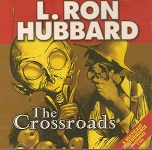
 A couple of tales that stood out for me in this collection Unborn Tomorrow by Mack Reynolds is a mystery with a male and female pair of New York City private investigators who have a client with a story tell. Its, clever, funny and manages a fairly unique twist on the time travel theme. Waste Not, Want by Dave Dryfoos is the story of an aged widower living in a society in which consumer consumption isn’t just fashionable it’s required by law. This is more of a vignette than a story, but if you’re interested, that idea (compulsory consumption), also pops up in Robert Silverberg’s second novel, Starman’s Quest too.
A couple of tales that stood out for me in this collection Unborn Tomorrow by Mack Reynolds is a mystery with a male and female pair of New York City private investigators who have a client with a story tell. Its, clever, funny and manages a fairly unique twist on the time travel theme. Waste Not, Want by Dave Dryfoos is the story of an aged widower living in a society in which consumer consumption isn’t just fashionable it’s required by law. This is more of a vignette than a story, but if you’re interested, that idea (compulsory consumption), also pops up in Robert Silverberg’s second novel, Starman’s Quest too.
 Short Science Fiction Collection 031
Short Science Fiction Collection 031
By various; Read by various
15 Zipped MP3 Files or Podcast – Approx. 5 Hours 31 Minutes [UNABRIDGED]
Published: LibriVox.org
Published: November 19, 2009
Science Fiction is speculative literature that generally explores the consequences of ideas which are roughly consistent with nature and scientific method, but are not facts of the author’s contemporary world. The stories often represent philosophical thought experiments presented in entertaining ways. Protagonists typically “think” rather than “shoot” their way out of problems, but the definition is flexible because there are no limits on an author’s imagination. The reader-selected stories presented here were written prior to 1962 and became US public domain texts when their copyrights expired.
Podcast feed: http://librivox.org/rss/3674
iTunes 1-Click |SUBSCRIBE|
 Competition
Competition
By James Causey; Read by Bellona Times
1 |MP3| – Approx. 22 Minutes [UNABRIDGED]
Published: LibriVox.org
Published: November 19, 2009
They would learn what caused the murderous disease—if it was the last thing they did! From Galaxy Science Fiction May 1955.
 Devil’s Asteroid
Devil’s Asteroid
By Manly Wade Wellman; Read by Gregg Margarite
1 |MP3| – Approx. 1 Hour 6 Minutes [UNABRIDGED]
Published: LibriVox.org
Published: November 19, 2009
“The Rock Bred Evolution in Reverse!” From Comet July 1941.
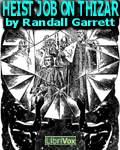 Heist Job On Thizar
Heist Job On Thizar
By Randall Garrett; Read by Norm
1 |MP3| – Approx. 24 Minutes [UNABRIDGED]
Published: LibriVox.org
Published: November 19, 2009
In the future, we may discover new planets; our ships may rocket to new worlds; robots may be smarter than people. But we’ll still have slick characters willing and able to turn a fast buck—even though they have to be smarter than Einstein to do it. From Amazing Stories October 1956.
 The Hunted Heroes
The Hunted Heroes
By Robert Silverberg; Read by Gregg Margarite
1 |MP3| – Approx. 31 Minutes [UNABRIDGED]
Published: LibriVox.org
Published: November 19, 2009
The planet itself was tough enough—barren, desolate, forbidding; enough to stop the most adventurous and dedicated. But they had to run head-on against a mad genius who had a motto: Death to all Terrans! From Amazing Stories September 1956.
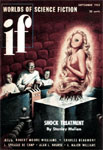 The Last Supper
The Last Supper
By T.D. Hamm; Read by Bellona Times
1 |MP3| – Approx. 4 Minutes [UNABRIDGED]
Published: LibriVox.org
Published: November 19, 2009
Before reading this story, prepare yourself for a jolt and a chill in capsule form. O. Henry could have been proud of it. It could well become a minor classic. From If Worlds of Science Fiction September 1952.
 Old Rambling House
Old Rambling House
By Frank Herbert; Read by Gregg Margarite
1 |MP3| – Approx. 17 Minutes [UNABRIDGED]
Published: LibriVox.org
Published: November 19, 2009
All the Grahams desired was a home they could call their own … but what did the home want? From Galaxy Science Fiction April 1958.
 Pythias
Pythias
By Frederik Pohl; Read by Gregg Margarite
1 |MP3| – Approx. 12 Minutes [UNABRIDGED]
Published: LibriVox.org
Published: November 19, 2009
Sure, Larry Connaught saved my life—but it was how he did it that forced me to murder him! From Galaxy Science Fiction February 1955.
 Revenge
Revenge
By Arthur Porges; Read by Steven Anderson
1 |MP3| – Approx. 20 Minutes [UNABRIDGED]
Published: LibriVox.org
Published: November 19, 2009
Hell may have no fury like a woman scorned, but the fury of a biochemist scorned is just as great — and much more fiendish. From Amazing Stories February 1961.
 Solander’s Radio Tomb
Solander’s Radio Tomb
By Ellis Parker Butler; Read by Steven Anderson
1 |MP3| – Approx. 20 Minutes [UNABRIDGED]
Published: LibriVox.org
Published: November 19, 2009
“I first met Mr. Remington Solander shortly after I installed my first radio set. I was going in to New York on the 8:15 A.M. train and was sitting with my friend Murchison and, as a matter of course, we were talking radio.” First published in Amazing Stories June 1927, later in Amazing’s April 1956 issue.
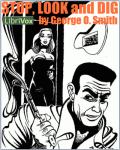 Stop, Look and Dig
Stop, Look and Dig
By George O. Smith; Read by Ric F
1 |MP3| – Approx. 36 Minutes [UNABRIDGED]
Published: LibriVox.org
Published: November 19, 2009
The enlightened days of mental telepathy and ESP should have made the world a better place, But the minute the Rhine Institute opened up, all the crooks decided it was time to go collegiate! First published in Space Science Fiction, March 1953.
 Such Blooming Talk
Such Blooming Talk
By L. Major Reynolds (aka Louise Leipiar); Read by Steven Anderson
1 |MP3| – Approx. 7 Minutes [UNABRIDGED]
Published: LibriVox.org
Published: November 19, 2009
A bit of levity never hurt anyone—even a science fiction editor, writer or reader, we hope. And a laugh has been known to lighten a heavy load and even change the path of history. So—we give you this brief moment with an amazed scientist and his startling creations—for a brief chuckle. From Fantastic Universe March 1954.
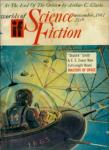 Sweet Their Blood And Sticky
Sweet Their Blood And Sticky
By Albert R. Teichner; Read by Gregg Margarite
1 |MP3| – Approx. 14 Minutes [UNABRIDGED]
Published: LibriVox.org
Published: November 19, 2009
They weren’t human—weren’t even related to humanity through ties of blood—but they were our heirs! From “Worlds of If” November 1961.
 Unborn Tomorrow
Unborn Tomorrow
By Mack Reynolds; Read by Bellona Times
1 |MP3| – Approx. 31 Minutes [UNABRIDGED]
Published: LibriVox.org
Published: November 19, 2009
Unfortunately, there was only one thing he could bring back from the wonderful future … and though he didn’t want to … nevertheless he did… From Astounding Science Fiction June 1959.
 Vanishing Point
Vanishing Point
By C.C. Beck; Read by MGVestal
1 |MP3| – Approx. 10 Minutes [UNABRIDGED]
Published: LibriVox.org
Published: November 19, 2009
In perspective, theoretically the vanishing point is at infinity, and therefore unattainable. But reality is different; vanishment occurs a lot sooner than theory suggests… From Astounding Science Fiction July 1959.
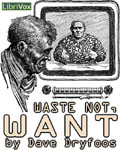 Waste Not, Want
Waste Not, Want
By Dave Dryfoos; Read by Bellona Times
1 |MP3| – Approx. 18 Minutes [UNABRIDGED]
Published: LibriVox.org
Published: November 19, 2009
Eat your spinach, little man! It’s good for you. Stuff yourself with it. Be a good little consumer, or the cops will get you…. For such is the law of supply and demand! From If Worlds of Science Fiction September 1954.
[In addition to the readers, this audio book was produced by Gregg Margarite, Wendel Topper and Lucy Burgoyne]
Posted by Jesse Willis



